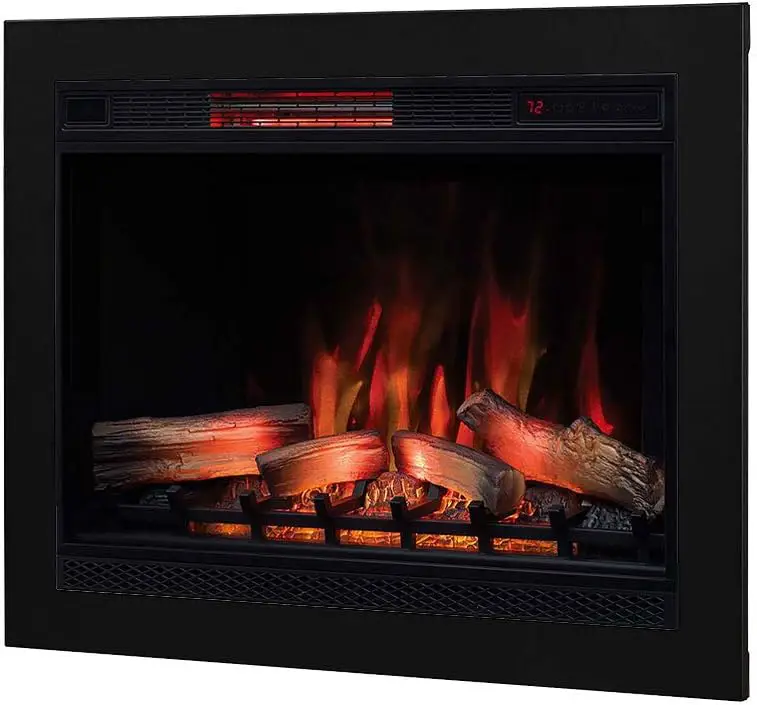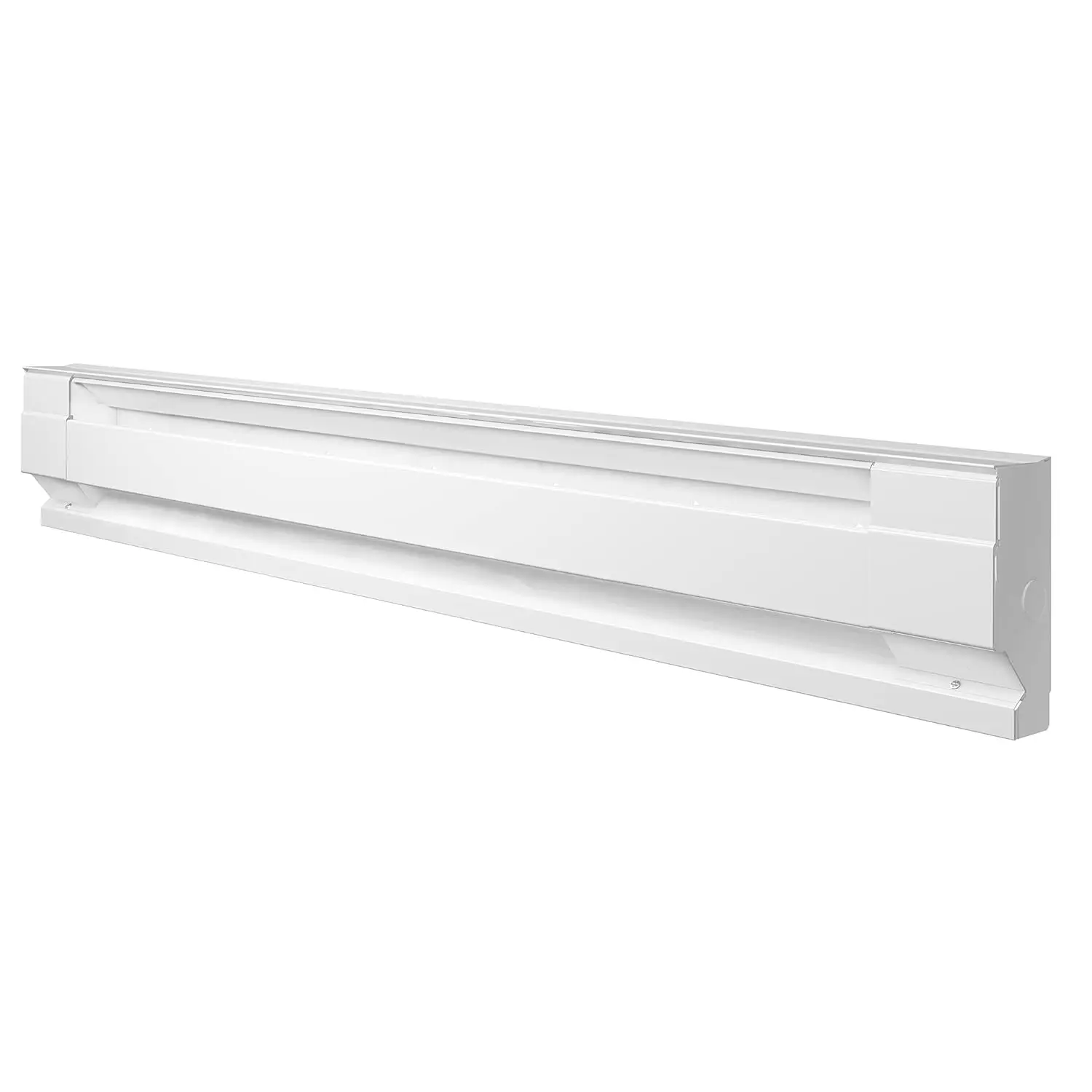When it comes to efficiently heating your home, two popular options often come into consideration: electric fireplaces and baseboard heaters. Each of these appliances has its unique features, advantages, and disadvantages. However, choosing the ideal one is essential for optimal results.
Electric Fireplace VS Baseboard Heater
Electric fireplaces are renowned for their ability to provide not only warmth but also a touch of elegance and ambiance to any space. Unlike traditional wood-burning fireplaces, electric fireplaces are hassle-free and require minimal installation. With realistic flame effects and customizable settings, they create a cozy atmosphere that goes beyond mere functionality.
On the other hand, baseboard heaters focus primarily on efficiency and functionality. These heating units are designed to provide targeted warmth to specific zones in your home. With their straightforward installation and no-nonsense operation, baseboard heaters are an excellent choice for those seeking a reliable and cost-effective heating solution.
Electric Fireplace VS Baseboard Heater
| Feature | Electric Fireplace | Baseboard Heater |
|---|---|---|
| BTU (British Thermal Units) | Varies (typically 4,000 – 9,000 BTU) | Varies (typically 3,000 – 5,000 BTU) |
| Installation Expenses | Moderate to High | Moderate |
| Electricity Cost | Varies (depends on usage and electricity rates) | Varies (depends on usage and electricity rates) |
| Ease of Installation | Easy (Plug and Play for many models) | Relatively Easy (requires electrical connection) |
| Heating Area | Typically, smaller rooms or specific zones | Effective for individual rooms or zones |
| Ambiance | Provides visual appeal with flame effects | Primarily functional, lacks visual appeal |
| Mobility | Usually portable and can be moved around | Stationary, installed along walls |
| Maintenance | Low maintenance, minimal cleaning required | Low maintenance, occasional cleaning of dust |
| Safety Features | Overheat protection, cool-to-touch surfaces | Overheat protection, stays relatively cool |
| Initial Cost | Varies (mid to high range) | Varies (mid to high range) |
| Long-Term Costs | Electricity costs can accumulate over time | Moderate electricity costs over time |
Are Electric Fireplaces More Efficient Than Baseboard Heaters?
If you’re looking to heat smaller rooms or specific zones, opting for an electric fireplace is an effective choice. However, baseboard heaters may be more suitable if you want to warm up a larger area.
In terms of cost-effectiveness, the electric fireplace emerges as the winner. On average, it costs $32.50 per month to operate. In contrast, electric baseboard heaters can incur an average monthly cost ranging from $150 to $200 in well-insulated homes.
Try Our Recommendation:
 |
ClassicFlame SpectraFire Plus Infrared Electric Insert | Product Dimensions: 10.35″D x 37.72″W x 30.3″H Material: Metal Installation Type: Built In,Ground Mount Heat Output: 5200 British Thermal Units Special Feature: Led Flame |
Check Price |
 |
Cadet F Series 48″ Electric Baseboard Heater | Special Feature: Programmable Color: White Form Factor: Pedestal Usage: Indoor/Outdoor |
Check Price |
Electric Fireplace VS Baseboard Heater Cost Comparision
| Usage Scenario | Electric Fireplace | Baseboard Heater |
|---|---|---|
| Cost per Hour | $0.27 | $1.25 – $1.67 |
| 5 Hours Cost | $1.35 | $6.25 – $8.35 |
| 12 Hours Cost | $3.24 | $15.00 – $20.00 |
| Monthly Cost (12 hours per day) | $32.50 | $150 – $200 |
Pros And Cons of Electric Fireplace
Pros of Electric Fireplaces
-
Easy Installation
-
No Ventilation Required
-
Energy Efficiency
-
Adjustable Heat and Flame Settings
-
Safety Features
-
Portability
-
Aesthetic Appeal
-
No Mess or Maintenance
Cons of Electric Fireplaces
-
Dependence on Electricity
-
Limited Heating Capacity
-
Initial Cost
-
Realism Factor
-
Not a Primary Heating Source
-
Environmental Impact (depending on power source)
Baseboard Heater Pros And Cons
Pros of Baseboard Heaters:
-
Silent Operation
-
Zonal Heating
-
No Ductwork Required
-
Long Lifespan
-
Low Initial Cost
-
Individual Room Control
Cons of Baseboard Heaters:
-
Slow Heating Response
-
Uneven Heating
-
Space Requirements
-
Potential for High Electricity Bills
-
Not Ideal for Large Spaces
-
Aesthetic Impact
Related Post: Electric Fireplace VS Space Heater
Key Factors in Choosing Between Electric Fireplace and Baseboard Heater
1) Energy Efficiency: Comparing the Costs
When it comes to energy efficiency, both electric fireplaces and baseboard heaters have their merits. Electric fireplaces often feature energy-saving modes and programmable thermostats, allowing you to control the heat output.
Baseboard heaters, however, are known for their zonal heating capabilities, allowing you to heat only the rooms you use, potentially reducing overall energy consumption.
2) Installation and Portability: The Convenience Factor
Installing an electric fireplace is usually a hassle-free process that doesn’t require significant renovations. They come in various designs, including wall-mounted and freestanding options, offering flexibility in placement.
While easy to install, baseboard heaters are typically fixed to the baseboard and may limit furniture placement.
3) Safety Considerations: A Priority in Home Heating
Safety is paramount when choosing a heating solution. Electric fireplaces often have cool-to-touch surfaces, making them a safer option, especially for homes with children or pets.
Though generally safe, baseboard heaters may pose a risk if covered or obstructed, potentially leading to overheating.
4) Maintenance: The Lowdown on Upkeep
In terms of maintenance, both electric fireplaces and baseboard heaters are relatively low-maintenance. Electric fireplaces typically require occasional cleaning of the flame effects, while baseboard heaters may need occasional dusting and ensuring proper ventilation.
5) Noise Levels: Creating a Comfortable Environment
One factor often overlooked is the noise level produced by these heating appliances. Electric fireplaces operate silently, contributing to a peaceful environment.
While generally quiet, baseboard heaters may have a subtle humming sound during operation.
6) Cost Comparison: Upfront Investment vs. Long-Term Savings
The upfront cost of electric fireplaces can vary based on features and design, while baseboard heaters are generally more budget friendly.
However, considering long-term energy savings and the potential increase in home value due to an electric fireplace’s aesthetic appeal, the overall cost-effectiveness should be evaluated over time.
Related Post: Electric Fireplace Beeping Issue
Final Thoughts: Electric Fireplace VS Baseboard Heater
In conclusion, choosing between an electric fireplace and a baseboard heater depends on your needs and preferences. If you prioritize ambiance, aesthetic appeal, and flexibility in placement, an electric fireplace may be the ideal choice. On the other hand, if efficient zonal heating, cost-effectiveness, and simplicity are your priorities, a baseboard heater could be the perfect fit.
Evaluate the factors that matter most to you and decide to align with your heating and lifestyle preferences. Remember, the best heating solution is the one that brings warmth and comfort to your home as efficiently and enjoyably as possible.
Affiliate Disclosure: Fireplaceadviser.com is a participant in the Amazon Services LLC Associates Program. We may earn a commission when you click on certain links on this site and purchase.

Hello!! I am Jamal Khan. I often fix my home electric heaters and gas stove problems and research the common issues in the heating units to improve my knowledge and expertise. The aim of establishing fireplaceadviser.com is to share my expertise and knowledge with my audience.












